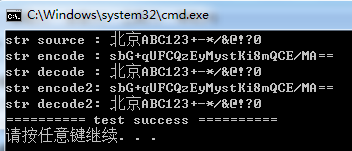base64開源庫介紹及使用
阿新 • • 發佈:2018-12-27
網上有一些開源的base64編解碼庫的實現,下面介紹幾個:
cppcodec是一個僅包括標頭檔案的C++11庫,用於編解碼RFC 4648中指定的base64, base64url, base32, base32hex等,它的License為MIT,原始碼在https://github.com/tplgy/cppcodec ,最新發布版本為v0.2,在windows下需要vs2015及以上才可以正常編譯。
b64.c是一個C語言實現的base64編解碼庫,它的License為MIT,原始碼在https://github.com/littlstar/b64.c。
在https://stackoverflow.com/questions/342409/how-do-i-base64-encode-decode-in-c
關於base64的介紹可以參考:https://blog.csdn.net/fengbingchun/article/details/85016088
以下是兩種base64開源庫(b64.c和stackoverflow中給出的)實現的測試程式碼:
#include "funset.hpp" #include <stdio.h> #include <stdlib.h> #include <stdint.h> #include <string> #include <b64/b64.h> namespace { // reference: https://stackoverflow.com/questions/342409/how-do-i-base64-encode-decode-in-c static char encoding_table[] = {'A', 'B', 'C', 'D', 'E', 'F', 'G', 'H', 'I', 'J', 'K', 'L', 'M', 'N', 'O', 'P', 'Q', 'R', 'S', 'T', 'U', 'V', 'W', 'X', 'Y', 'Z', 'a', 'b', 'c', 'd', 'e', 'f', 'g', 'h', 'i', 'j', 'k', 'l', 'm', 'n', 'o', 'p', 'q', 'r', 's', 't', 'u', 'v', 'w', 'x', 'y', 'z', '0', '1', '2', '3', '4', '5', '6', '7', '8', '9', '+', '/' }; static char *decoding_table = NULL; static int mod_table[] = { 0, 2, 1 }; void build_decoding_table() { decoding_table = (char*)malloc(256); for (int i = 0; i < 64; i++) decoding_table[(unsigned char)encoding_table[i]] = i; } char* base64_encode(const unsigned char *data, size_t input_length, size_t *output_length) { *output_length = 4 * ((input_length + 2) / 3); char *encoded_data = (char*)malloc(*output_length); if (encoded_data == NULL) return NULL; for (int i = 0, j = 0; i < input_length;) { uint32_t octet_a = i < input_length ? (unsigned char)data[i++] : 0; uint32_t octet_b = i < input_length ? (unsigned char)data[i++] : 0; uint32_t octet_c = i < input_length ? (unsigned char)data[i++] : 0; uint32_t triple = (octet_a << 0x10) + (octet_b << 0x08) + octet_c; encoded_data[j++] = encoding_table[(triple >> 3 * 6) & 0x3F]; encoded_data[j++] = encoding_table[(triple >> 2 * 6) & 0x3F]; encoded_data[j++] = encoding_table[(triple >> 1 * 6) & 0x3F]; encoded_data[j++] = encoding_table[(triple >> 0 * 6) & 0x3F]; } for (int i = 0; i < mod_table[input_length % 3]; i++) encoded_data[*output_length - 1 - i] = '='; return encoded_data; } unsigned char* base64_decode(const char *data, size_t input_length, size_t *output_length) { if (decoding_table == NULL) build_decoding_table(); if (input_length % 4 != 0) return NULL; *output_length = input_length / 4 * 3; if (data[input_length - 1] == '=') (*output_length)--; if (data[input_length - 2] == '=') (*output_length)--; unsigned char *decoded_data = (unsigned char*)malloc(*output_length); if (decoded_data == NULL) return NULL; for (int i = 0, j = 0; i < input_length;) { uint32_t sextet_a = data[i] == '=' ? 0 & i++ : decoding_table[data[i++]]; uint32_t sextet_b = data[i] == '=' ? 0 & i++ : decoding_table[data[i++]]; uint32_t sextet_c = data[i] == '=' ? 0 & i++ : decoding_table[data[i++]]; uint32_t sextet_d = data[i] == '=' ? 0 & i++ : decoding_table[data[i++]]; uint32_t triple = (sextet_a << 3 * 6) + (sextet_b << 2 * 6) + (sextet_c << 1 * 6) + (sextet_d << 0 * 6); if (j < *output_length) decoded_data[j++] = (triple >> 2 * 8) & 0xFF; if (j < *output_length) decoded_data[j++] = (triple >> 1 * 8) & 0xFF; if (j < *output_length) decoded_data[j++] = (triple >> 0 * 8) & 0xFF; } return decoded_data; } void base64_cleanup() { free(decoding_table); } } // namespace int test_b64_base64() { std::string str = "北京ABC123+-*/&@!?0"; fprintf(stdout, "str source : %s\n", str.c_str()); char* str_en = b64_encode((const unsigned char*)str.c_str(), str.length()); fprintf(stdout, "str encode : %s\n", str_en); std::string tmp(str_en); //fprintf(stdout, "str_en length: %d\n", tmp.length()); unsigned char* str_de = b64_decode(tmp.c_str(), tmp.length()); fprintf(stdout, "str decode : %s\n", str_de); free(str_en); free(str_de); size_t output_length_encode = 0; char* str_en2 = base64_encode((const unsigned char*)str.c_str(), str.length(), &output_length_encode); std::string tmp2(str_en2, output_length_encode); fprintf(stdout, "str encode2: %s\n", tmp2.c_str()); size_t output_length_decode = 0; //fprintf(stdout, "output_length_encode: %d, str_en2 length: %d\n", output_length_encode, tmp2.length()); unsigned char* str_de2 = base64_decode(str_en2, output_length_encode, &output_length_decode); std::string tmp3((char*)str_de2, output_length_decode); fprintf(stdout, "str decode2: %s\n", tmp3.c_str()); free(str_en2); free(str_de2); base64_cleanup(); return 0; }
執行結果如下:可見兩種實現的base64編解碼結果一致。

